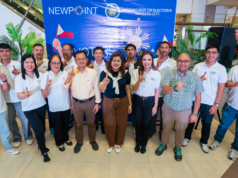ANGELES CITY – “A betrayal of its very reason for being.”
The advocacy group Pinoy Gumising Ka Movement (PGKM) yesterday rapped the Clark Development Corp. (CDC) for “pushing the commercialization of freeport lands to the detriment of businesses in the contiguous communities.”
Last week, the CDC announced a specialty restaurant investing some P7.6 million to locate within the CDC’s new zoning map delineating a strip for “restaurant operators catering to high-end clientele, casual dining or bistro, and family dining.”
“While we are not against the restaurant or any commercial enterprise at Clark per se, we are apprehensive of their negative impact upon the businesses outside,” said PGKM Chairman Ruperto Cruz, “and on the overall development of the freeport.”
In the past few years, Cruz observed, there has been a proliferation of commercial enterprises at the Clark Freeport, “notably gasoline stations, restaurants and bars, coffeeshops, even clothing stores.”
“These, on top of the duty-free shops that even pre-dated the Clark airport,” he added. Cruz noted the “patently uneven playing field the local businesses face, given the duty-free and other tax privileges accorded to Clark locators, plus the opportunities for smuggling emanating therefrom.”
“On the other hand, the local businesses are burdened with the value added tax, the sin tax, business license fees, mayor’s permits, and just about any levy both local and national government could think of,” Cruz said. “A lopsided competition there, in favour of the Clark’s commercial enterprises.”
RA 7227
“The CDC is conveniently forgetting if not wilfully violating the spirit and letter of RA 7227,” Cruz averred.
He was citing Republic Act 7227 or the Bases Conversion and Development Act of 1992 that created CDC, among other agencies mandated to transform the former US military bases into engines of economic growth and spur the parallel development of the contiguous communities, at the time devastated by the Mount Pinatubo eruptions.
“As a special economic zone then, and as a freeport now, Clark has been envisioned as an area for foreign investments, labor-intensive and export-oriented industries. That is precisely why tax and duty-free incentives have been given to locators,” Cruz explained.
Incompetence
“A seeming bankruptcy of ideas obtained in the CDC, where the real purpose and use of Clark is concerned,” Cruz opined. “Thus, CDC’s brains limited to the purely commercial.” Cruz challenged the CDC officials to “name just three investments on the industrial scale in the last two years, if only to disprove their perceived incompetence.”
Clark’s biggest “industrial draws” like Nanox Phil., Yokohama Tires Phil., Phoenix Semi-Conductor Phil., HLD Clark Steel Pipe Co., L&T Industrial Group, Texas Instruments and SMK Electronics Phil. have been “long-time locators that have grown the freeport for many years, some even for decades.”
“These firms have flourished not because of, but despite the incompetence of the CDC leadership,” Cruz said.
Sabotage
“Graver than simple incompetence,” Cruz noted, “is the reality of the conspiracy to sabotage the development of Clark.” Cruz sees this in the “continuing constriction” of the Clark land area. “The Clark aviation area, which is the primary asset for the international airport, is losing ground to commercial enterprises from restaurants to gasoline stations,” Cruz claimed.
“We may just suddenly wake up to find eateries already encroaching on the runways.” Last May, the CDC signed an agreement with a Singaporean company for the lease of a three-hectare area running in between Clark’s main M.A. Roxas Highway and the Perimeter Road. To be built is a mixed-use facility for business process outsourcing, residential, commercial and retail companies.
“Again, in a lopsided competition against the local businesses,” Cruz said, “and at the same time eating up large chunk of land that could have been otherwise used for aviation-related purposes.” Cruz noted that even the Astro Park has not been spared from being reduced in area.
What used to be the tree-lined open spaces parallel to Fields Avenue were converted into commercial stalls housing videoke bars, massage parlors, eateries beauty shops, and the like at the time the SM City Clark mall was being constructed during the incumbency of Atty. Emmanuel Y. Angeles at CDC.
“We are hoping that the ongoing construction of the roundabout at the entrance to the freeport would not signal the conversion of more areas in the park for commercial use,” Cruz said. That was more of a hope against hope, added Cruz. “Given the characters running the CDC.”




